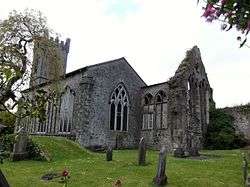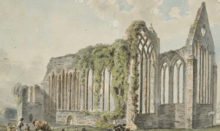St. John's Abbey, Kilkenny
| Mainistir Sheáin | |
 | |
 Location within Ireland | |
| Monastery information | |
|---|---|
| Other names |
St John's Priory without the walls The Lantern of Ireland |
| Order | Canons Regular (Augustinians) |
| Established | 1212 |
| Disestablished | 1691 |
| Diocese | Ossory |
| People | |
| Founder(s) | William Marshal, 1st Earl of Pembroke |
| Architecture | |
| Status | Inactive |
| Style | Late Gothic |
| Site | |
| Location | Michael Street, Kilkenny, County Kilkenny |
| Coordinates | 52°39′14″N 7°14′54″W / 52.653848°N 7.248448°W |
| Public access | no |
| Official name | St John's Abbey (Kilkenny) |
| Reference no. | 344 & 331 |
St. John's Abbey, also called St John's Priory, is a medieval Augustinian abbey and National Monument located in Kilkenny City, Ireland.[1]
Location
St. John's Abbey is located on the east bank of the River Nore, at the corner of Michael Street and John Street.[2]
History
Prior to 1200, the Canons Regular (Augustinians) had a house on John Street. Bishop of Ossory Felix Ua Duib Sláin granted a charter to Brother Osbert, the Prior of Saint John's Hospital, giving the prior the tithes of Kilkenny Castle. In 1211, William Marshal, 1st Earl of Pembroke granted land to build the Priory of St. John the Evangelist. In 1220 Mass was said for the first time in the Priory, and around 1227 the Augustinians were granted the churches of Saint Evin and Saint Mary in New Ross by William Marshal, 2nd Earl of Pembroke. In 1290 the Lady Chapel was completed. In 1329 the bell-tower collapsed.
The Prior and community of Saint John’s were imprisoned in 1331. Some time between 1361 and 1405, the Prior of Saint John’s, Walter Walsh, was excommunicated and the Priory was placed under interdict by the Bishop of Ossory.
In 1540, with the Dissolution of the Monasteries, the monastery was granted to the City Corporation.
During the Confederate era (1642–52), the site was granted to the Order of Friars Minor Capuchin. In 1645 Cardinal Giovanni Battista Rinuccini got the priory opened up to the Jesuits, but they were driven out in 1650.
After the end of the Williamite War, both orders were expelled and the site fell into ruin.
Around 1780, the nave of the main Chapel, its two towers and attendant buildings were demolished. The stone was used to build a military barracks.
In 1817 the still standing Lady Chapel was re-roofed and consecrated as the Church of Ireland Church of St. John's: this is the extant Priory.[3][4]
Buildings

The Lady Chapel of St John's was known for its many stained glass windows (supposedly inspired by Sainte-Chapelle, Paris, 1238–48) and the five triple lancet windows lighting the south side, and was called the "Lantern of Ireland."
The roofless remains of the chancel of the old priory church with a seven-light east window (c. 1250). Inside the ruins are late mediaeval tombs including the altar tomb of a Purcell couple (1500) with carvings of the Crucifixion and the Apostles. The effigy of the lady wears a long flowing robe and a horned headdress.[6][7]
References
- ↑ "The Irish penny magazine" – via Google Books.
- ↑ "The Lantern of Ireland".
- ↑ "The Priory of St. John the Evangelist".
- ↑ "St Johns Priory - Attractions - Churches, Abbeys and Monasteries - All Ireland - Republic of Ireland - Kilkenny - Kilkenny City - Discover Ireland".
- ↑ "Holdings: St. John's Abbey, [Kilkenny]".
- ↑ http://www.patrickcomerford.com/2009/09/mediaeval-priory-and-modern-parish-in.html
- ↑ "Kilkenny Arts Festival 11-20 August 2017".